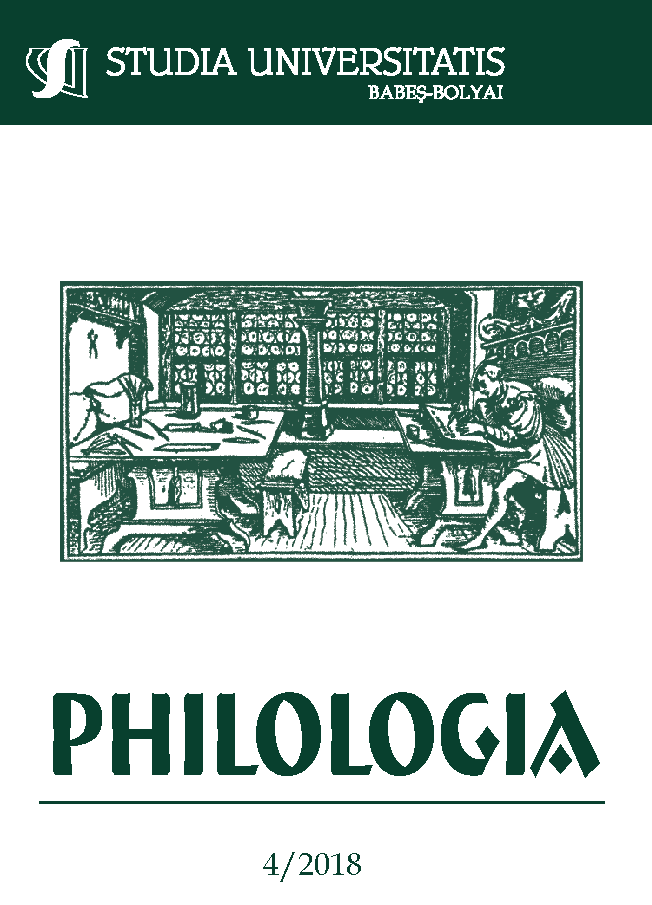POSTHUMAN ELEMENTS IN SAMUEL BECKETT’S “KRAPP’S LAST TAPE”
DOI:
https://doi.org/10.24193/subbphilo.2018.4.16Keywords:
Samuel Beckett, Krapp’s Last Tape, Posthumanism, post-bodied minds, technological symbiosis, memory, corporeal decay, subjugation to mortality.Abstract
Posthuman Elements in Samuel Beckett’s “Krapp’s Last Tape”. The present paper aims to offer insight regarding the post-anthropocentric elements present in one of Samuel Beckett’s most innovative plays, Krapp’s Last Tape. In order to support my premise, I wrote a comprehensive theoretical outline of posthumanism, taking into account aspects such as the adaptation of the brain to new technologies and the influence they exert, the appearance and usage of prosthetics, symbiotic relationships and the interconnectedness between body, mind and environment. I then proceeded to offer my own interpretation of the target text, focusing on Beckett’s recurrent tendency to represent the body as an aged, decaying and fallible organic vessel and relevant human-machine symbiosis. Humanity’s centrality is deconstructed by focalising on its subservience to suffering.
Rezumat. Elemente postumane în piesa “Ultima Bandă a lui Krapp” de Samuel Beckett. Axată pe una dintre cele mai inovatoare piese din palmaresul Beckettian, lucrarea de față indică prezența elementelor post-antropocentrice în Ultima Bandă a lui Krapp. Pentru a demonstra validitatea acestei premise, am început prin a concepe un synopsis al teoriei postumaniste, axându-mă pe aspecte cum ar fi adaptarea creierului la noile tehnologii și influența exercitată de acestea, apariția și utilizarea elementelor prostetice, relațiile simbiotice și interconectivitatea dintre corp, minte și mediu. Interpretarea textului a luat în considerare tendința recurentă a lui Beckett de a reprezenta corpul uman ca un vehicul organic failibil, în descompunere, dar și simbioza dintre om și mașinărie. Piesa arată în repetate rânduri că omul este supus suferinței, deconstruind astfel poziția centrală a umanității.
Cuvinte cheie: Samuel Beckett, “Ultima Bandă a lui Krapp”, Postumanism, minți post-corporale, simbioză tehnologică, memorie, deconstrucție, mortalitate
References
Badmington, Neil. 2003. “Theorizing Posthumanism.” Cultural Critique 53, Posthumanism (Winter), 10-27.
Beckett, Samuel. 2006. Krapp’s Last Tape, in The Complete Dramatic Works, London: Faber & Faber, 213-23.
Borbely, Carmen & Petrar, Petronia. 2014. Our Heteromorphic Future: Encoding the Posthuman in Contemporary British Fiction. Cluj-Napoca: Presa Universitară Clujeană.
Braidotti, Rosi. 2013 The Posthuman. Cambridge: Polity Press.
Callus, Ivan & Herbrechter, Stefan. 2011. “Humanity Without Itself: Robert Musil, Giorgio Agamben and Posthumanism.” Towards a New Literary Humanism. Edited by Andy Mousley. London: Palgrave Macmillan, 143-58.
Clark, Andy. 2003. Natural Born Cyborgs. Minds, Technologies and the Future of Human Intelligence. Oxford: Oxford University Press.
Clarke, Bruce & Rossini, Manuela. 2017. The Cambridge Companion to Literature and the Posthuman, Cambridge: Cambridge University Press.
Cohn, Ruby 1980. Just Play: Beckett’s Theater. Princeton, New Jersey: Princeton University Press.
Damasio, Antonio R. 1994. Descartes’s Error. Emotion, Reason and the Human Brain. New York: Avon Books.
Deleuze, Gilles 1987. Foucault. Translated by Sean Hand. Minneapolis and London: The University of Minnesota Press.
Derrida, Jacques 1972. “Les Fins de L'homme.” Marges de la philosophie Paris: Minuit, 129-64.
Haraway, Donna J. 2008. When Species Meet. Minneapolis and London: University of Minnesota Press.
Hassan, Ihab. 1993. “Prometheus as Performer: Toward a Posthumanist Culture?” The Georgia Review 31, 830-50
Hayles, N. Katherine. 2012a. How we Became Posthuman. Virtual Bodies in Cybernetics, Literature and Informatics. Chicago and London: The University of Chicago Press.
Hayles, N. Katherine. 2012b. How We Think. Digital Media and Contemporary Technogenesis. Chicago and London: The University of Chicago Press.
Herbrechter, Stefan. 2013. Posthumanism: A Critical Analisys. London: Bloomsbury.
Kroker, Arthur. 2014. Exits to the Posthuman Future. Cambridge: Polity Press.
Lyotard, Jean-Francois. 1999. A Postmodern Fable. Minneapolis: University of Minnesota Press.
Manovich, Lev. 2003. Software Takes Command. New York and London: Bloomsbury.
Pepperell, Robert. 2003. The Posthuman Condition: Consciousness Beyond the Brain. Portland: Intellect.
Vandenberghe, Frederic. 2004. “Posthumanism, or the Cultural Logic of Global Neo-Capitalism.” Societe, 24-25.
Verbeek, Peter-Paul. 2011. Moralising Technology. Understanding and Designing the Morality of Things. Chicago: University of Chicago Press.
Downloads
Published
How to Cite
Issue
Section
License
Copyright (c) 2018 Studia Universitatis Babeș-Bolyai Philologia

This work is licensed under a Creative Commons Attribution-NonCommercial-NoDerivatives 4.0 International License.





 ©Studia Universitatis Babeş-Bolyai Philologia. Published by Babeș-Bolyai University.
©Studia Universitatis Babeş-Bolyai Philologia. Published by Babeș-Bolyai University.